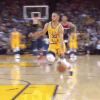BorisDK1 wrote:Sleepy51 wrote:Must have been some bad hash, because you were talking down to me thinking that the 2004 statement was the only data in the conversation. Your information was incorrect.
As I informed you, I'm at work and kind of swamped. I've had a very disjointed (and one-sided) conversation with Fairview on that very data before. I note that you couldn't be bothered to go back and look. (If you can accuse me of laziness, the opposite is certainly up for discussion.)
I've reviewed the 2005-6 Nets' financials. Any chance you looked at their Statement of Cash Flows, where they hemorrhaged ~ $27 million in FY 2005 and $40 million in FY 2006 in cash?
I'm disappointed that I still can't get an honest acknowledgement from you that indeed the RDA does appear on the statement of operations on audited GAAP financial statements.
I did look at the entire financial statement when deadspin published it, and no I did not focus on the statement of cash flows. A net cash loss does not represent the companies "loss." For example, an increase in accounts receivable in a year of increasing sales and revenues is by no way shape or form an actual loss. It's a negative movement in net cash on the balance sheet, to balance net cash to net income, but it is not necessarily pertinent in a discussion of profitability.
I focused on the P&L (less the specious depreciation expense) which still results in a net loss for the Nets. I know the New Jersey nets lost money. I do not dispute that the Nets lost money. But, a business loss can result from a number of factors. Some of those factors can be inherent in the business model or business market. Others can result from ownership, management and capitalization strategies. In the case of the NBA lockout, for me and for the players, the crux of the debate comes down what amount of losses are attributable to ownership & management strategic inputs, vs. what portion of losses are attributable to the NBA player compensation system.
There are different valuation tools and different accounting reports for different purposes. A statement of cash flows happens to include the movement of funds around the balance sheet: changes in AR, accrued salaries, changes in AP, etc change on a balance sheet year to year and those changes are impacted by management decisions and strategy. There is also a loss on "equity share of NBA related entities" which most likely represents the league's substantial investment in new media over the past decade. I believe it is not only acceptable, but important to isolate those kinds of factors and look at the underlying business model and market in the context of this labor dispute. EBITA was an easy place to start because Forbes has those numbers for all teams. The Nets P&L viewed with a critical eye represents an even more accurate tool, but we don't have 30 P&L's from each year of the CBA to review.
The players claim that the owners are overstating their losses by virtue of accounting convention holds up to scrutiny. Whether the NBA is using net income (which includes the RDA) or is talking specifically about net cash, I don't agree that those are the appropriate tools given the context of NBA team operations, and I doubt the players representatives agree either.
As a fan, why do I care? Because just like I understand the risk to the game posed by owners giving out too many years of guaranteed money, I also recognize the risk to the game if the NBA financial system guarantees NBA franchises a profit no matter how poorly they choose to run or capitalize their teams. If the owners of NBA teams are not at risk of financial loss, the management and operational decision-making driving these teams will suffer. I have lived that as a fan under the current CBA. I do not see further insulating NBA owners from financial loss as a progressive decision for the fan experience.
Some of these guys need to fail when they have failed.
That's going to be it for the back and forth between us. I am not comfortable with your tone, or your moving goal posts, or your refusal to acknowledge that you mispoke or were misinformed about the SOO. There is no basis for a respectful or productive exchange with you.


















